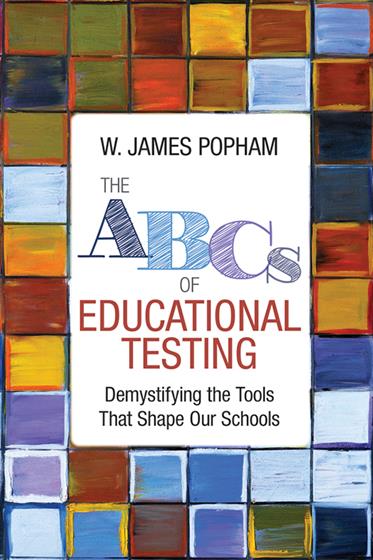Quote by Ken O’Connor, Consultant/Author/Former High School Teacher and Curriculum Coordinator, Assess for Consulting Inc.:
“In the wonderful The ABCs of Educational Testing, Jim Popham says, “Too few folks who should know something about educational testing do not,” and sadly, he is right. If people in his five target audiences (teachers, educational administrators, educational policymakers, parents of school-age children, and everyday citizens) read this entertaining (yes, “entertaining,” a word not often associated with educational testing!) and informative book it would go a long way toward correcting this unfortunate reality.
With his unique phrases and word choices (e.g., “I find myself magnetically drawn to a textbook that I wrote myself.”) Jim Popham clearly describes and explains the critical aspects of educational testing that need widespread understanding. He stresses the importance of tests being used and interpreted for the purpose for which they are intended, and shows why many of the tests used to evaluate schools, teachers and students are inappropriate. He does this through 10 short chapters that illuminate his 9 assessment-related understandings and his concerns about the lack of assessment literacy. In particular, he provides clarity to often confusing concepts such as validity and reliability and fairness in testing.
Popham says that “hands down” the chapter on validity is the most important, but for me the most important chapter is the one on formative assessment, which he identifies as “inexcusably underused.” I consider this to be the most important because my major involvement is with K-12 teachers and administrators and until recently most teachers and administrators, through no fault of their own, have not understood the instructional uses of assessment. This is changing because of the influence of people like Jim Popham, Rick Stiggins and Dylan Wiliam. Jim provides a definition of formative assessment that stresses that it is a process (not an event) that provides evidence, which enables teachers to adjust their teaching and students to adjust their learning strategies so that greater learning takes place. Traditionally teachers have put a number on everything students do and every number has been part of student grades regardless of the purpose of the assessment, but the research shows that it is descriptive feedback and identifying student understandings and misconceptions while the learning is going on that makes the greatest contribution to improving student achievement. Jim Popham understands this and makes the case that it is “remarkably effective” and “seriously underutilized.”
To sum up, this book is a must read for the five audiences that Popham identifies because it is critical that everyone has the 9 assessment related understandings that he so eloquently and clearly explains and describes.”
“In the wonderful The ABCs of Educational Testing, Jim Popham says, “Too few folks who should know something about educational testing do not,” and sadly, he is right. If people in his five target audiences (teachers, educational administrators, educational policymakers, parents of school-age children, and everyday citizens) read this entertaining (yes, “entertaining,” a word not often associated with educational testing!) and informative book it would go a long way toward correcting this unfortunate reality.
With his unique phrases and word choices (e.g., “I find myself magnetically drawn to a textbook that I wrote myself.”) Jim Popham clearly describes and explains the critical aspects of educational testing that need widespread understanding. He stresses the importance of tests being used and interpreted for the purpose for which they are intended, and shows why many of the tests used to evaluate schools, teachers and students are inappropriate. He does this through 10 short chapters that illuminate his 9 assessment-related understandings and his concerns about the lack of assessment literacy. In particular, he provides clarity to often confusing concepts such as validity and reliability and fairness in testing.
Popham says that “hands down” the chapter on validity is the most important, but for me the most important chapter is the one on formative assessment, which he identifies as “inexcusably underused.” I consider this to be the most important because my major involvement is with K-12 teachers and administrators and until recently most teachers and administrators, through no fault of their own, have not understood the instructional uses of assessment. This is changing because of the influence of people like Jim Popham, Rick Stiggins and Dylan Wiliam. Jim provides a definition of formative assessment that stresses that it is a process (not an event) that provides evidence, which enables teachers to adjust their teaching and students to adjust their learning strategies so that greater learning takes place. Traditionally teachers have put a number on everything students do and every number has been part of student grades regardless of the purpose of the assessment, but the research shows that it is descriptive feedback and identifying student understandings and misconceptions while the learning is going on that makes the greatest contribution to improving student achievement. Jim Popham understands this and makes the case that it is “remarkably effective” and “seriously underutilized.”
To sum up, this book is a must read for the five audiences that Popham identifies because it is critical that everyone has the 9 assessment related understandings that he so eloquently and clearly explains and describes.”
Ken O’Connor, Consultant/Author/Former High School Teacher and Curriculum Coordinator
Assess for Consulting Inc.


